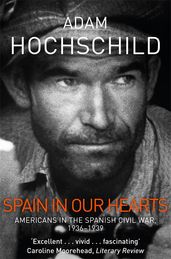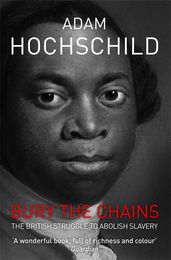Synopsis
From the moment it began in 1936, the Spanish Civil War became the political question of the age. Hitler and Mussolini quickly sent aircraft, troops and supplies to the right-wing generals bent on overthrowing Spain's elected government. Millions of people around the world felt passionately that rapidly advancing fascism must be halted in Spain; if not there, where? More than 35,000 volunteers from dozens of other countries went to help defend the Spanish Republic.
Adam Hochschild, the acclaimed author of King Leopold's Ghost, evokes this tumultuous period mainly through the lives of Americans involved in the war. A few are famous, such as Ernest Hemingway, but others are less familiar. They include a nineteen-year-old Kentucky woman, a fiery leftist who came to wartime Spain on her honeymoon; a young man who ran away from his Pennsylvania college and became the first American casualty in the battle for Madrid; and a swashbuckling Texas oilman who covertly violated US law and sold Generalissimo Francisco Franco most of the fuel for his army. Two New York Times reporters, fierce rivals, covered the war from opposite sides, with opposite sympathies. There are Britons in Hochschild's cast of characters as well: one, a London sculptor, fought with the American battalion; another, who had just gone down from Cambridge, joined Franco's army and found himself fighting against the Americans; and a third is someone whose experience of combat in Spain had a profound effect on his life, George Orwell.
Details
Reviews
Hochschild’s contribution lies in the storytelling, his sure command of military history, and his beautiful sense of private hurt, which together yield original insight. An astute observer of contrasts, he navigates the hairpin turns between intimacy and barbarism, euphoria and despair, naivety and cynicism. The book effortlessly hopscotches from global history to individual – and emotional – experience.
While Hochschild focuses on volunteers such as Berg, he doesn't ignore the war's local dynamic and global dimensions. What makes the book so effective, however, is his decision to explore these complexities through a set of interwoven biographies . . . Hochschild tells nuanced tales of political awakenings and disillusionment, but also steadfast ethical commitment. He never descends into easy moralising.
Beautifully written with a hawk-eye for the telling anecdote, Spain in Our Hearts constitutes an endlessly fascinating and utterly unputdownable survey of the war to defend democracy in Spain that was not only the first act of the Second World War but also, for many across the world, the last great cause.
Spain in Our Hearts is narrative non-fiction at its very best. Hochschild's achievement is to make this trial-by-combat story come alive, as if it were happening now. It is impossible for a reader not to identify and feel compassion for those sons and daughters of America who risked and often gave their lives for a cause that could not ultimately prevail against the darker forces of Franco, Hitler, Mussolini, Stalin - and Texaco. A seamlessly-woven, unputdownable tapestry of war in Europe; intensely, unforgettably moving.



